America Obscura (8)
By:
November 18, 2016
HILOBROW friend Andrew Hultkrans is a legendary freelance journalist; we have admired his range, erudition, and virtuosity since the early ’90s, when he was a columnist at MONDO 2000. We’re proud to publish this series of essays by Andrew, each of which originally appeared (as noted) elsewhere.
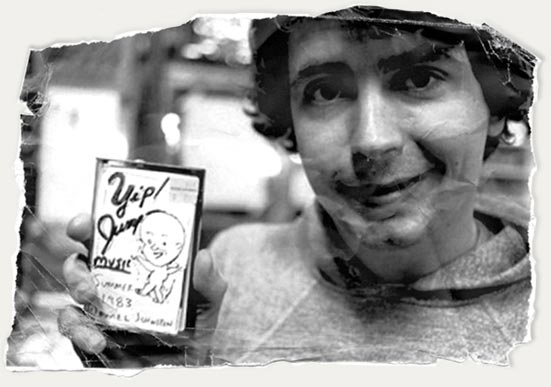
Daniel Johnston interview with Andrew Hultkrans
ANDREW HULTKRANS: Hi, how are you? I hear you’re going to be moved to another building soon.
DANIEL JOHNSTON: Yes, I’m moving to another building here at the old mental hospital place. I will have a lot more freedom. I’ll be able to walk around downtown in my own territory of Austin, Texas.
AH: Are you glad to be back in Austin?
DJ: Yes, I am. I didn’t really want to come here under the circumstances, having to come to the old loony bin again. But now it’s going to all work out. I’ll be back in town, and I’m planning to do live shows.
AH: You’ve been an incredibly prolific songwriter over the years, producing more songs than most people I can think of. I was wondering how you write songs. How do they come to you?
DJ: I’ll just start banging on some chords, and I’ll mumble something.
AH: So the music comes to you when you’re fooling around on the instrument, and then you mumble a melody until the words come?
DJ: It’s not very often that I try to think of a subject. It just comes out.
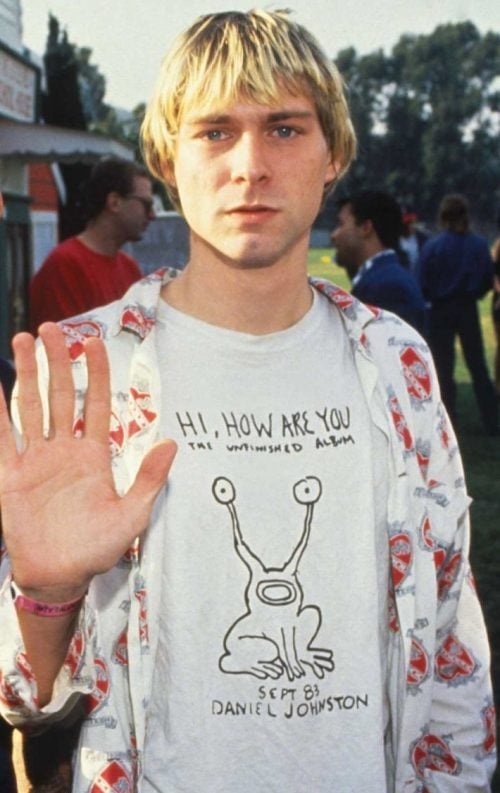
AH: There are some characters that you’ve written several songs about, particularly Casper the Friendly Ghost. And there are other characters that you mention, maybe alter egos of yourself, like Joe from “Keep Punching Joe.” Can you talk about why you’re interested in Casper, King Kong, and some of these other characters?
DJ: In Beatles songs, they would refer to things from another song. Like John Lennon said, “The walrus was Paul.” I started referring to other songs that I had written and started to make like an epic of songs that were referring to each other. Then the drawings refer to the songs, and the songs refer to the drawings.
AH: Casper, in particular, like even on your latest album, you have a song called “I Know Casper.”
DJ: A long time ago when there was God and there was Jeremiah the Bullfrog, Satan took Lucifer and entered Lucifer and made him jealous of Jeremiah. Lucifer said something like, “He thinks he’s better than him.” And God killed Jeremiah. And Jeremiah’s ghost is Casper the Friendly Ghost. And Jeremiah is John Belushi.
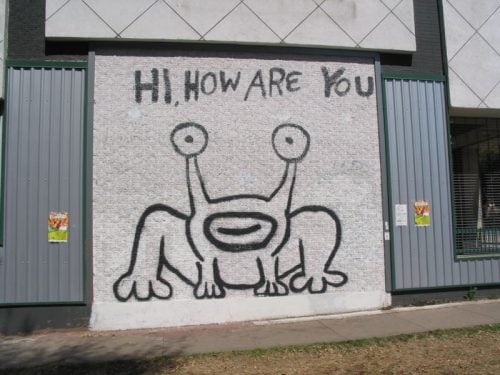
AH: So do you think about Casper a lot?
DJ: Yeah, he’s a personal friend of mine.
AH: You say that in the song. Like when you see him on the TV, and you turn every channel and he’s still there?
DJ: Yeah, he can do things like that. Like I can pick somebody out on the TV, and they will be Casper. And he’ll be a hero or something.
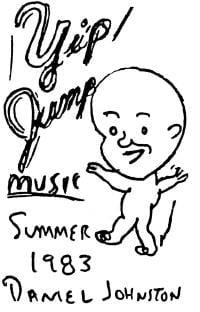
AH: And that’s Casper on the cover of Yip Jump Music, your drawing of Casper.
DJ: Yeah. There’s a male and a female Casper. On the cover, the one that got printed up on the CD is a female Casper, but the song’s about the male Casper.
AH: From that CD booklet—and from talking to your manager Jeff—I can tell that you’re definitely interested in comics.
DJ: Oh yeah, Jack Kirby’s my favorite.
AH: I figured that—like all the great ’60s Captain America stuff. If you like Jack Kirby, you must like his Fantastic 4 work too.
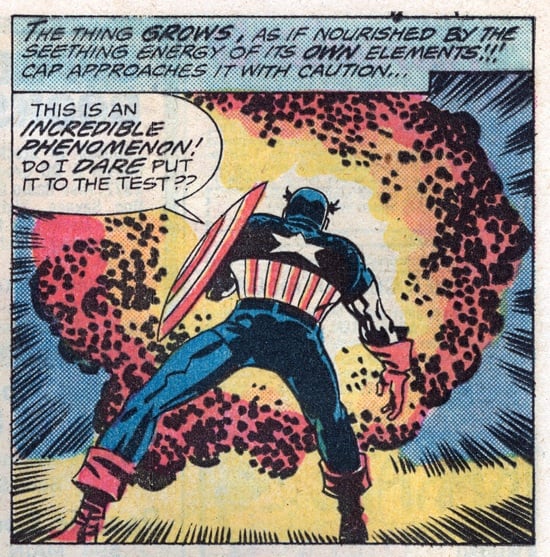
DJ: Of course. The Incredible Hulk, the Mighty Thor…
AH: I know you’re interested in Captain America. Can you tell me a little bit about why you like him so much?
DJ: One time I had some money, and I wanted to buy a puzzle, and my mom wouldn’t let me buy the puzzle. So I was real mad at my mom. So later that day at the grocery store, I saw Captain America, and it was like wow, Captain America. And I read it, and I always remembered that name Jack Kirby. And I always tried to find Jack Kirby comic books and Captain America. Captain America is a symbol to me of the glory of the red, white, and blue, of the American dream. That it’s still true today. There’s still the Bill of Rights.
AH: So you think Captain America is still someone we can look towards as an ideal?
DJ: Captain America will return. In the flesh. In the Great Tribulation there will be a great Captain America who will save many from total doom.
AH: That’s good to hear. I read someplace that you said that Stan Lee is making a mistake by saying that he owns Captain America, and that you disagree with this.
DJ: Jack Kirby and Joe Simon in the ’40s made up Captain America. And then in the ’60’s, Stan Lee and Jack Kirby…
AH: Did Marvel…
DJ: They were working on a number of heroes together. Before that, Jack would think up the origin, and they would work up the stories together in person or over the phone, whatever they were doing in New York at that time. But when they brought Captain America back—when they did the origin again—it said Stan Lee. It was the exact same origin that was in the original story. So later I would buy these books that they reprinted Captain America in, and it would say “by Stan Lee.” Stan Lee is writing in the introduction, “When I invented Captain America….” And I would go, “Wait a minute, I know the real story behind this.” Captain America isn’t a fictional story; his origin is before the war. Not that I don’t love what Stan Lee has done. If it wasn’t for Stan Lee, Jack Kirby might have had a hard time getting a job. They really did a good job, what they did, it was incredible. And they were good friends.
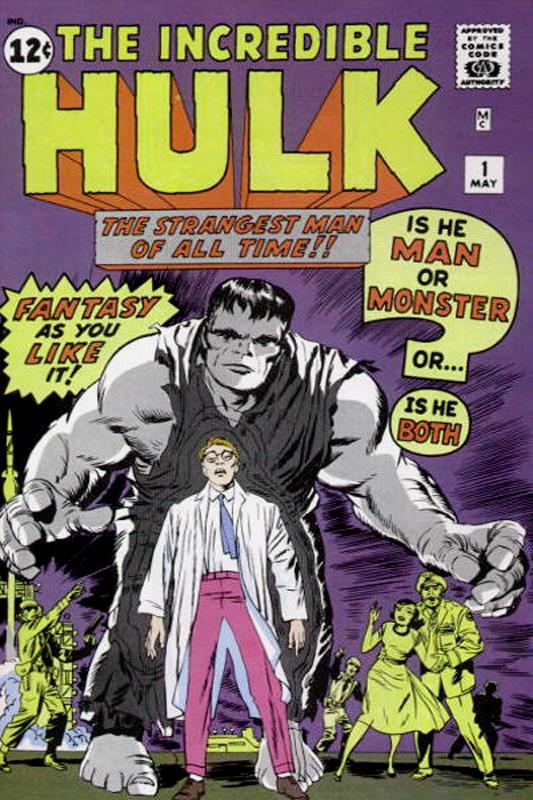
AH: What about some of the other early Marvel heroes? Do you like the Hulk and Thor?
DJ: The Incredible Hulk is Frankenstein. A lot of people forget that. And when John Buscema would draw the Hulk, it was always with that big “Aaargh!” The Hulk didn’t always look like that. He was a very thinking and compassionate guy. And he didn’t like evil people. That’s why he would smash them.
AH: Right. But you think he’s like Frankenstein because he’s the product of science? It happened because he was near a radioactive explosion.
DJ: It was gamma rays.
AH: But it was an explosion, a scientist’s test in the desert.
DJ: Right. But see, the comic book characters exist in the imagination of Jack Kirby and Stan Lee, the writers, but they also exist on another plane. They are also, I believe, prophecies of future heroes to come.
AH: Now they’re myth, but soon they’ll be history.
DJ: That’s true. They’ll be real. They’ll be superheroes like that for real during the time of the Great Tribulation. They’ll be great, mighty superheroes. God will not forget the friends of the Ghost.
AH: Right. Well, what about the Hulk, Spider Man, and Thor—characters who have problems? Stan Lee and Jack Kirby created the superhero with an Achilles heel.
DJ: Well, everybody has problems.
AH: But they made the heroes more human in that way.
DJ: Well, a lot of superheroes of the Bible started out as just a human. A lot of the great prophets like Elijah were just human beings that grew up in faith and believed in us and became superheroes.
AH: So you see a lot of these comic characters as Biblical prophets.
DJ: As a mirror to the future and the past. Because the artwork was so great, it wasn’t just that the man was inspired by doing acid or something. He was a prophet.
AH: And Kirby was just transmitting the word of God…
DJ: Just like I do in my cartoons and in my songs. They write themselves. You ask me how I do it. I’ve paid attention to craft and everything, and I can pull a song together when I want to. That’s what John Lennon always said. The good ones just really come. And I like to get busy, and I plan to start writing songs again once I get a hold of my guitar. And put together a song for a live album called Frankenstein Love.
AH: Why Frankenstein Love?
DJ: Because I love Frankenstein. Because I love me.
AH: I think one drawing of yours really represents what you were just talking about, the one—I think it’s of you—on the inside of the Yip Jump Music booklet. It’s a man with an open head with an angel flying above him holding an organ or a keyboard. And there’s a devil dragging his ankles away.
DJ: Yeah, there’s always sort of the yin yang. Good triumphs over evil every time.
AH: I believe that. But the angel represents your muse coming to you?
DJ: Seeds well planted will sprout.
AH: I want to ask you about more of your drawn characters. The frog creature with the eye stalks—the long eyes—what’s his name?
DJ: That’s Jeremiah. God only chose Jeremiah because I said, “Listen, if Satan gets in here, and they accuse me, kill me.” And he said, “God, I brainwashed him,” and I said, “Hey, listen, if he’s in here, you kill me first, because if you don’t kill me, they will, and I’ll be dead for sure. But I know that I’ll live on because love never dies.”
AH: And then when Jeremiah gets killed, he becomes Casper the Friendly Ghost.
DJ: Right. I am the Pontius of Jeremiah.
AH: What about the flying eye? You have a song about the flying eye.
DJ: Well, it’s kind of a movie, the show that everybody sees.
AH: Which one is that?
DJ: That’s how come the photography is so wild, because they fly it back and forth and do different angles and God edits it, puts it together on a big mixing board.
AH: Which film are you talking about?
DJ: I’m on film 24 hours, where everybody sees me.
AH: I see what you mean. But you have a song called “Fly Eye”…
DJ: [Sings] Fly eye, into the night, Fly eye, it’s alright…
AH: Right. It’s on Continued Story.
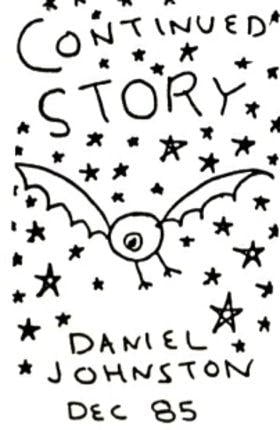
DJ: Yes. See, these eyes get kind of tired of filming me all the time because I get depressed, and they have a hard job to do, and they’re working overtime all the time. It’s very hard work for them to do, but they do a fine job. I’d like to commend The Order of Fly Eyes, because they all have a personality all of their own.
AH: Are they menacing to you?
DJ: Well, at first I didn’t know what they were, and then somebody told me, “Those are the eyes of Satan,” and I said, “Thank you.” But they’re my friends because they’re always there, and they’re filming me, and they’re entertaining a lot of people.
AH: What about musical influences? I know you love the Beatles.
DJ: The Beatles are the greatest. The Beatles are still together. John, Paul, George, and Ringo are recording all the time, and they’re recording albums for when the Great Tribulation is over, and during the 1,000 years of Christ, they’ll be jamming…
AH: The Beatles will be back in the End Times too…
DJ: They’ll be back, and they’ll be back sooner. Everyone is going to come back, and they’ll be better. Marilyn Monroe will be back. I’m bringing all kinds of people back in sort of a family reunion.
AH: Right. In the song “The Beatles,” you say that you “really wanted to be like him, but he died,” and obviously he’s John, so is he your favorite Beatle?

DJ: Yes, he is. He was really like my father. I was born in heaven before I was born here. He was my father, and Paul McCartney was my twin brother.
AH: I see. What did you think about the time when John and Paul got angry with each other and broke up The Beatles?
DJ: Well, they didn’t really get all that angry.
AH: John’s lyrics were definitely stranger than Paul’s…
DJ: But Paul McCartney wrote “Hey Jude.” But who wrote “Yesterday”? Was it Frankenstein or was it Paul McCartney? I mean, I can’t get over this. Listen to those lyrics. I know that Frankenstein will write a song never before hearing “Yesterday.” He’ll pick up his guitar and he’ll say, [sings] “Yesterday, all my troubles seemed so far away / Now I need a place to hide away / Oh, I believe in yesterday.” He won’t be remembering the song—he’ll be writing it! Paul McCartney just wrote the melody, and he wrote the lyrics. Who wrote it? Who wrote what? When I hear a song on the radio, am I writing it? Some people believe this kind of stuff. My friend is always running around saying, “I’m producing this video, this television show; this is me singing this.” And I think, “That’s what I used to think, but it sure sounds crazy.”
AH: Who else do you like? Jeff Tartakoff told me that you liked Elvis Costello at one point.
DJ: Yeah, I loved Elvis Costello. He has a song, “You’d Better Watch Your Step,” remember?
AH: He has a great sense of wordplay.
DJ: He said, “If you’re young and original, get out before, you get to watch your step.” I was watching him in concert in a front-row seat, and when he came to that line, he turned and looked right at me. It freaked me out.
AH: That’s great. I saw him this year too. He’s getting older, but he’s still doing it.
DJ: Yeah, I saw him again a few years later, just a couple of years ago.
AH: What do you think about that line?
DJ: It’s good advice.
AH: Some people like yourself remain original all the time.
DJ: Some people can’t help to be original. Other people need just a little bit of encouragement. We’re one of a kind, every one of us. And they’re trying to brainwash you and make you think you’re just another one, and we’re all the same, but that’s not the way it is. We all have different ancestors, and it’s part of our heritage. We don’t have to inherit anything that we don’t want. If we have something better—our past, our family, or our own lives—we don’t have to keep that with us or carry it like a flag. We can always change and look for a better life. If you’re old and original, get up and do something!
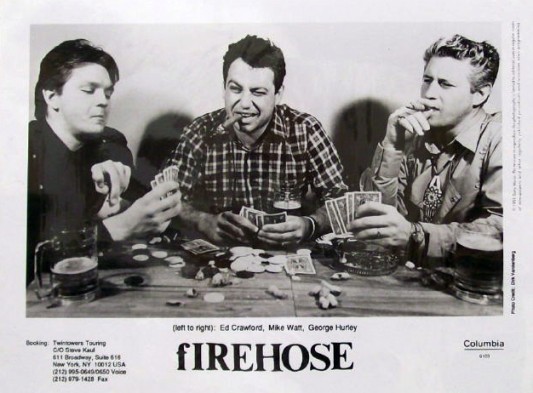
AH: That sounds like Mike Watt of fIREHOSE, who I know you’ve met. He always says after he plays a concert, “Now go out and start your own band!”
DJ: Good advice. Hey, here in Austin anybody has a band.
AH: I was going to ask you about the Austin music scene. What kind of stuff do you like out there?
DJ: I’m excited about checking it out again as soon as I get out of the hospital. There are quite a few more clubs than there used to be, and at least five times as many bands.
AH: The scene is booming. Everybody in the country went there because they think it’s the center of music.
DJ: Yeah, it really was something when I first came here with the traveling carnival back in 1985. I hung around working at McDonald’s, and then started going to the clubs and seeing all these great bands, and started playing out myself. First thing I knew, MTV came to town, and we were all stars. Everybody I knew was on this show. It was funny.
AH: A lot of great bands have covered your tunes. I was wondering if you liked their versions of your songs.
DJ: I like it any time I hear someone try to do one.
AH: What are some of your favorites?
DJ: Oh, I like fIREHOSE.
AH: Do you like the Yo La Tengo version of “Speeding Motorcycle”?
DJ: One thing about the Yo La Tengo version of “Speeding Motorcycle,” it sounds like they’re dead.
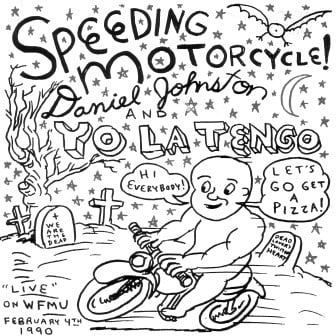
AH: That’s true. It’s a lot slower than your version. Yours is more upbeat.
DJ: I thought we rocked it pretty good over the phone.
AH: I heard you just met them recently. Did they come by to see you?
DJ: No, they haven’t visited me. There’s all kinds of rumors about people visiting me, but my manager is the only one that comes by. If I’m still here, invite people to come see me.
AH: What about Sonic Youth? You did a track on 1990 with a couple of Sonic Youth members. Do you like those guys?
DJ: I love them, yeah. They made some great music.
AH: Are you allowed to listen to music now?
DJ: Yeah, we have our own radio, and we have a tape of Artistic Vice that my manager brought the other day. It’s sort of a hit with a few of us.
AH: I’ll bet. I was thinking about some of the tunes on that album, like “I Killed the Monster.” What is that about?
DJ: It was written by Frankenstein. Right before Jesus returns, Frankenstein will kill the monster.
AH: I see. And the monster is who? Is the monster Satan?
DJ: Vile Corrupt takes on many forms. He’s my enemy, but he doesn’t bother me anymore. He wants me to be happy to write songs because he loves me to do drawings and write songs. He wants me to be productive so he can live. He wants me to sing songs about him so he can fight his battles in the drawings.
AH: What about when you first started playing music? Some of your songs sounded like hymns, or the melodies sounded like church music. Did you start to sing in the church?
DJ: I grew up singing all the time in West Virginia.
AH: You got a lot of church music from that.
DJ: Yeah, it sort of sounds like that sometimes, I guess.
AH: Is that why you got hold of a chord organ when you first started out playing and recording?
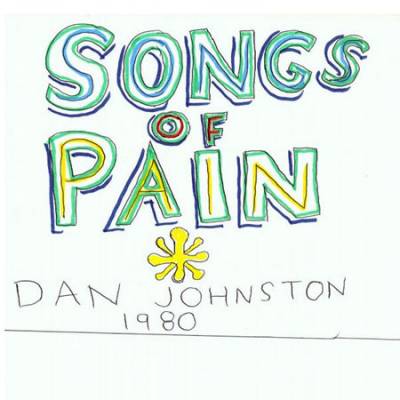
DJ: Well, when I first started recording I was playing piano. Songs of Pain—that’s actually my first recording. We’ll release the best of that period this year and call it Songs of Pain. A lot of people say it’s my best.
AH: How did you learn piano, by yourself?
DJ: Well, I could read music, and I started figuring out chords, and I had the Compleat Beatles, and I would play the chords to the songs and sing them, the guitar chords. And that’s how I learned, by playing the guitar chords. I would rearrange the progressions in Beatles songs. By playing them in reverse or mixing them around, I would make up my own progressions.
AH: Did you pick up guitar next, or the chord organ?
DJ: When I came to Austin, I finally got a hold of a guitar. I’d been playing a little ukulele thing. This guy finally gave me a guitar, and I was real excited about it because it had nylon strings, and the strings were close together.
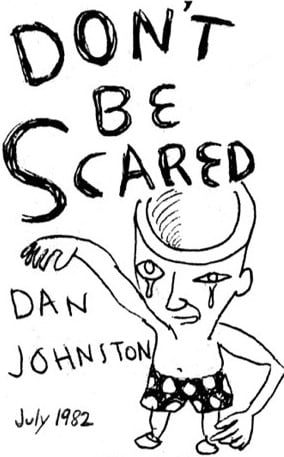
AH: Was that what you played “Sorry Entertainer” on, or was that the ukulele?
DJ: I played “Sorry Entertainer” on a little Smurf guitar.
AH: That’s cool sound. When did you get into the chord organ? That was a big sound for you.
DJ: That was in 1983 when I first moved to Texas. I was in Houston. And from Houston, I moved to San Marcos, and in San Marcos I joined a traveling carnival. And we traveled to Arizona, Colorado, New Mexico, and Texas. And that’s how I ended up in Austin. We came to town with the carnival.
AH: And did the carnival end there, or did you like Austin so much that you wanted to stay?
DJ: Well, I was out of a job. But I didn’t know about the music scene at all. All I knew about was 6th Street. And they all did top 40 music, and I didn’t think much about that. I didn’t really think I was going to make it in music. I hoped—I was telling people I was going to be a rock star—but it was a pleasant surprise.
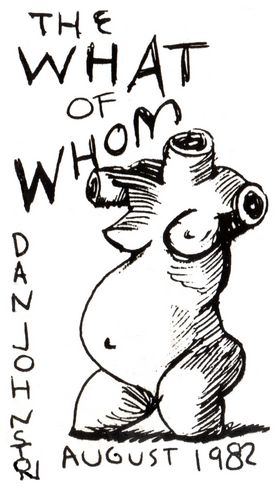
AH: What were you doing in the carnival? Were you playing music?
DJ: I was selling corn dogs.
AH: Were you writing songs at that time?
DJ: Yeah, I started working on some songs, like “Marching Guitars.”
AH: But you started playing the chord organ when you were first in Austin.
DJ: No, I started the chord organ in Houston. When I first moved to Texas, I lived in Houston with my brother.
AH: And how did you get a hold of the chord organ?
DJ: It was my nephew’s. I had to come down to get a job, because there were no jobs in West Virginia.
AH: That sound was really original. Are you beating on it really hard?
DJ: Some people thought I was playing percussion, but it’s just from hitting the keys so hard. I wasn’t really doing that intentionally.
AH: It’s probably one of the most original sounds I’ve ever heard in music—your voice with that sound. When did you start doing stuff like taping a track and then playing another song over it, like “Danny Don’t Rapp”?
DJ: Those were experiments in overdubbing. I hope to work someday in the studio and do a lot of overdubbing and multitracking.
AH: You’ve done some of that already.
DJ: Yeah, but every time I work in the studio it’s always rush, rush, rush. I look forward to the day when I can spend more time in the studio or have a studio that would let me record all the time.
AH: You’d rather record in the studio than buy yourself a tape recorder.
DJ: Yeah, I want the sound quality to be better. I don’t want to waste my time on a small tape recorder anymore except for demos. That’s why I thought it would be fun to do a live album, just get all the songs out there.
AH: I liked your Live at South by Southwest tape. It’s a little bit hard to hear, but I liked the performances a lot. In the studio work that you’ve done, have you enjoyed working with Jad Fair and Kramer?
DJ: I really enjoyed working with them.
AH: Can you tell me something about working with Jad and writing those songs together?
DJ: It was wild. We met up in New York when I was working with Kramer. Kramer wanted me to come up and try the studio, and that’s how I ended up going to New York. And Jad was there, and he had some lyrics, and I’d heard his album because he had sent it to my manager when I was living in Austin. And he had some lyrics, and I just sat down at the piano, and I think the first one was “Some Things Last a Long Time.” And we recorded a few other songs that day that haven’t been released. And Kramer says, “Hey, you two ought to get together and do an album!” And I said, “Sure.” So we ended up doing it a year later. I went to Maryland, and I wrote some lyrics, and we went up to his upstairs room where he had a drum set. I started playing drums, and he started playing guitar, and we recorded. “It’s Spooky” was the first song we did. I loved his lyrics. Every time he’d write out a little bit, I’d finish it. Like “Frankenstein Conquers the World.” We wrote a number of those together. The big thing about that is we’re going to reissue it with a bunch of unreleased tracks, because it wasn’t distributed very well. We’re reissuing it with extra tracks, like we did a version of the Butthole Surfers’ “Sweat Loaf.”
AH: Did you really meet Roky Erickson? Is that song true?
DJ: I knew him when he used to live here in town. The story is like on the record; that’s the whole story.
AH: You used to watch horror movies together.
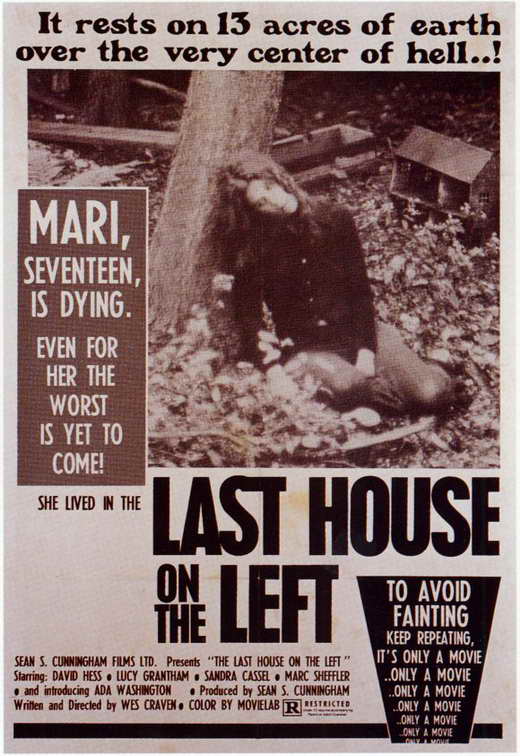
DJ: Yes, we did. We watched Third House on the Left. He really like that one. When it got to the end where all the people were killed, he kept rewinding it back.
AH: Is he a strange guy? Is he nice?
DJ: I think he’s a great guy.
AH: Did you play any music with him?
DJ: That was my intention, but we never got around to doing it. I played piano with his mother once.
AH: What’s she like?
DJ: She was real nice.
AH: She was a musician as well?
DJ: Yeah. They were a very friendly family.
AH: What about your cover of “Tomorrow Never Knows” on that album? You do it basically straight, then you stop and say,” No, no, no, don’t go down, don’t give in!”
DJ: That was sort of my opinion at that time, that some people might have been taking that old song in that way, taking it the opposite way that it was originally intended. They can take a regular lyric, and they can say, “This is what this means, and think about it that way,” and they twist it inside out. Then they tell the singer to sing it again, and they’re thinking that thought. And they sing it again, and everybody says, “Yeah, it sounds like that’s what he means.” It’s lies. Lies are terrible. Lies are black holes. Don’t fall into that void; you’ll never come back.
AH: That’s true. What do you think that song means?
DJ: I think it’s supposed to be something from The Book of the Dead. I think it’s “Relax and float downstream…”
AH: What about some of Lennon’s other bizarre lyrics, like the song “I Am the Walrus”? What was your opinion of that?
DJ: You see with dead dog’s eyes…
AH: Yeah, that’s a strange lyric. You have several songs like “King Kong” where you take a hero or somebody who’s been misunderstood, and you tell the story from their side, or you clear up some misunderstood facts about the story in defense of that person or character. I was wondering if there were other people, either from real life or fictional characters, that you feel were misrepresented by stories…
DJ: Captain America. He suffered the most.
AH: How’s that?
DJ: He was the greatest hero of all time.
AH: But how do you think that Stan Lee and Jack Kirby misrepresented him?
DJ: Captain America’s my father.
AH: Is that right? In the song “Rocket Ship” from Yip Jump Music you sing, “My bags are packed, I’m ready to go,” and it sounds a bit like Peter, Paul and Mary, but you’re getting into a rocket ship rather than a jet plane. Is that something you’ve ever wanted to do, to go up into space?
DJ: One day, I will. I’ll go to Mars or something.
AH: How come?
DJ: When I’m Frankenstein, I’ll go to Mars.
AH: Did you watch any science fiction movies? Are you interested in space travel?
DJ: Yes, I like science fiction.
AH: Have you read science fiction?
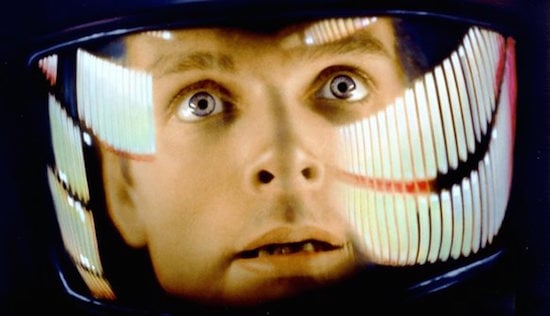
DJ: 2001. Planet of the Apes. When the United States is blown up, the apes will take over.
AH: You think so?
DJ: Yeah, just like in the movies. Just another one of them prophecies.
AH: So you believe in predestination?
DJ: Yeah, I’m already there; I’m in the future. I’m gone. I don’t dwell in the past; I live in the past too.
AH: Can you tell me something about how you feel about the final Tribulation, the End Times?
DJ: It’s all in the Book of Revelations.
AH: But not only what’s in there, but the superheroes and other characters that will return.
DJ: Many superheroes are described. They talk about the angels. It’s all there if you read it with an open mind, it’ll just open up for you. I mean, God wouldn’t let a Great Tribulation go by without some superheroes running around.
AH: That’s true. I think your song “Don’t Play Cards with Satan, He’ll Deal You an Awful Hand” is very powerful. Do you feel you’ve been through that situation?
DJ: It’s a mistake when you try to deal with the Devil. You shouldn’t give him any credit or any ground to stand on. You just don’t play cards with Satan, because he cheats. And you don’t want to play cards with a cheater. You shouldn’t gamble anyway, always hoping to get something for nothing. You should try to live an honest life and get what you pay for and pay what you get for.
AH: So “playing cards with Satan” was just a metaphor for some things that happened to you, or that anybody goes through when they’re tempted by the Devil?
DJ: I made a mistake, and I sinned against the female Holy Ghost, with a witch. I’ve called her evil before, but me and her are friends now. But she handed me a cosmic cube, like a prism. And I got this idea to give her a holy embrace, and I was trying to give her a shower, and I lost my old soul for a year and that’s what 1990 was all about.
AH: I see. But then you got yourself out of that eventually. Artistic Vice is the most upbeat album I think you’ve ever done, or one of them.
DJ: Yeah, it’s sort of Beatleish.
AH: Songs like “My Life Is Starting Over.”
DJ: Many of those songs are about the love of my life, Laurie.
AH: Are you still thinking about Laurie these days?
DJ: Yes I do. I think about her all the time. I have a home movie of her on video, and I like to watch it because it’s so lonely. And I try to talk to her, but I don’t hear her voice, and sometimes I wish she could hear me. We sent her a CD and an album and a cassette, so I’m hoping to get a reply from that.
AH: Why did you record this album in West Virginia? Were you at home with your parents?
DJ: Yeah. We just moved down here not too long ago. Outside of Houston, that’s where I was living when they brought me here.
AH: Did you meet Laurie in West Virginia or in Texas?
DJ: Yeah, when I was living in West Virginia and going to a branch of Kent State. I was sitting in the classroom, and in walked this beautiful girl. She was so beautiful, she was glowing. And I’ve never been affected so much then or since by a girl’s presence. It was like I didn’t know what to say, so I just said, “Hi, how are you?” And she said, “Hi, how are you?” And I couldn’t believe she was so friendly to me. And she worked in a store, and I was down there seeing her all the time. Before I met her, I found out her name, and I changed all my classes to her classes.
AH: So you got to know her a little bit?
DJ: Yeah, she worked in the store, and I went and hung out. I kind of regret the old days, because I hardly let her say a word because I was so happy being around her, I would just yell my head off, making funny jokes and everything, and she thought it was funny.
AH: Did you ever play music for her?
DJ: Yes, in fact that’s how my music career started. It was sort of a joke. I’d write these particular songs on piano, and I’d play them for her, and it was like, “You have lovely ankles, you’re a natural woman,” or something. So I played her that, and she said, “You know, you do that rather well.” Every day after that I was bang, bang, bang on that old piano. If you listen to the songs, you’ll see how many of the songs are about her. Even though she’s married now and has kids, I still love her. And I hope to at least be able to talk to her on the phone.
AH: What’s that song “The Startling Facts” really about?
DJ: It’s about one of the last times I saw her, at a funeral. And her boyfriend, the undertaker’s son, popped me the finger. So it’s pretty heavy symbolism for me, because I became obsessed with death and was certain it would happen to me. But “Such love a flame I overcame victorious / Filled my heart with such desire so grand and so glorious / Glory sweet an angel dear, here with me today / Not in person but in memory of me will always stay.”
AH: That’s a good memory you have. What do you think about Walt Disney’s stuff?
DJ: I love Walt Disney’s stuff. That’s another thing that’s happened, everybody trying to convince everybody that Walt Disney was evil. That’s ridiculous. You watch Bambi and Donald Duck and all them. They were good old dudes. That’s another thing that happened. They try to brainwash you. The Walt Disney company might not be in as fine shape as they were years ago, but to say that the whole thing was a conspiracy is completely ridiculous. But people fall for that, and they believe that Mickey is the Devil.
AH: Do you think that little kids are more in tune with what’s really going on?
DJ: Yeah, they know. They watch the TV shows. If they don’t like it, they change the channel too. They have the same choice.
AH: Did you watch a lot of TV when you were a kid?
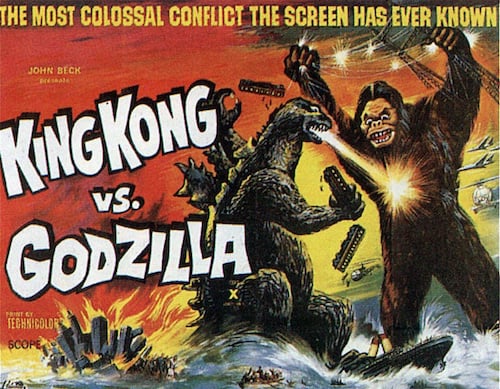
DJ: Oh yeah, I grew up with TV. I loved monster movies: Godzilla, King Kong, Frankenstein, the Wolfman, the Mummy. Frankenstein and King Kong were my favorites. My favorite movie when I was a kid was King Kong vs. Godzilla. I remember in elementary school, they asked me to write a history of my life, and I wrote, “I was born in California, and then yesterday I saw King Kong vs. Godzilla.”
AH: You were born in California?
DJ: Yes, Sacramento, California, January 22, 1961.
AH: One of my co-editors here told me that there are some people who are writing books and claiming to have channeled John Lennon’s spirit, and that John Lennon is speaking to them.
DJ: Those are just like false prophets you see on TV. They say they’ve got the Holy Ghost and are taking people’s money. All they talk about is money.
AH: So you don’t believe in those televangelist people?
DJ: No. Anyone who has the gift wouldn’t bastardize it like that. John Lennon wouldn’t talk to someone who would bastardize it. I imagine he’d talk to me.
AH: What are some of your favorite John Lennon songs?
DJ: Well, I like “Crippled Inside,” “Nowhere Man,” “Norwegian Wood,” “Strawberry Fields Forever,” “I Am the Walrus,” “I Want to Hold Your Hand,” all of his songs.
AH: Why do you think that someone like Charles Manson would misinterpret the “White Album” so badly?
DJ: He’s crazy. He thought the Beatles were telling him to kill people, so the Beatles must have wanted Charles Manson to kill people, which is certainly wrong. The Beatles were a good thing. They were singing “all you need is love.” Do you think they were secretly planning to kill everybody? Trying to hook up with some scum bum living out in a reservation hole? They were doing all their work for him?
AH: Not a chance. Do you follow politics?
DJ: I thought it was very disturbing what happened in Los Angeles. It’s not a good thing. They’re going to end up killing themselves or killing each other. A lot of them are programmed for suicide. I would like to say something now: There’s hope for everyone; there is a God; I believe in God; God stands by me and saved me from the mouth of the lion of suicide and violence.
AH: How do you think some of the presidents we’ve had lately have figured into this whole scheme?
DJ: I think Bush has done well. He’s trying. He’s got a lot of opposition. A lot of people with bad ideas just want to see bad things happen, and he’s trying to make things happen, and they’re just trying to work against him. He needs to take an iron hand and straighten things out.
AH: You believe in the End Times. Some people think that the End Times are going to come out of the Middle East and that events like the Iraq war are just precursors to greater strife.
DJ: There will always be wars and rumors of wars, but the United States will stand firm. They will not enter our soil.
AH: Do you think the United States is under God’s wing?
DJ: Yes. The United States is the Garden of Eden. And when the flood happened and the continents parted, the Garden of Eden was moved and isolated and protected by the ocean.
AH: What do you think of the ballet that’s being done in France to Yip Jump Music?
DJ: I think it’s pretty funny. I haven’t seen it or anything.
AH: How did they find out about your music?
DJ: My manager. He said, “Oh, by the way, somebody did a ballet of Yip Jump Music in French.”
AH: Some New York guy. Why do you think they picked Yip Jump Music?
DJ: Maybe because it’s a celibate album. When you have leotards on you’re supposed to be celibate or something.
AH: Is that what you thought of Yip Jump Music when you were doing it, a celibacy album?
DJ: Yeah, it was a celibacy album. I thought I’d try it. All the songs are cheerful.
AH: Yeah, really enthusiastic.
DJ: It was really a step up from the way I was feeling.
AH: So you were using some of the songs to cheer yourself up at the time?
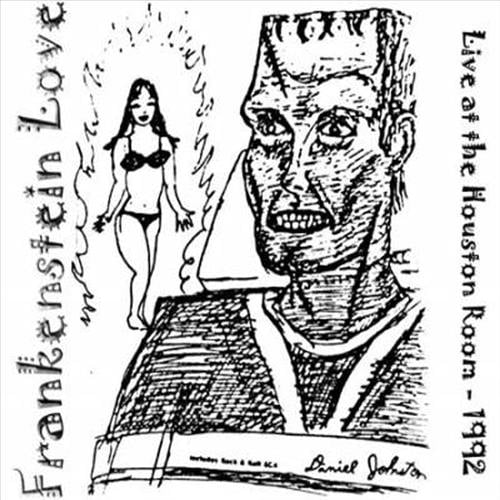
DJ: Yeah, I changed the subject. Instead of singing about funeral homes and everything, I thought I’d sing about speeding motorcycles. I read in the newspaper that some carnival had a speeding motorcycle, and I underlined it. Different songs from that period were about just trying to change the subject, which is what I need to do now—I was working on this album before I was incarcerated in the hospital here called Frankenstein Love. And I was writing some cool songs about Frankenstein. And it was these cool chords. And now I’m trying to write songs, and I’m getting all these sappy love songs. It’s not quite up to par.
AH: What happened to the songs for Frankenstein Love?
DJ: They’re all half-finished.
AH: What is the tone of them?
DJ: Serious.
AH: Pre-apocalyptic? What kind of role does Frankenstein play in some of these songs? Is he a good guy or a bad guy?
DJ: When I die, there will be no music. 100 years after I’m dead, they’ll resurrect my body and turn me into Frankenstein. Then I’ll tour with The Beatles and the Butthole Surfers. There will be music like there’s never been music before.
AH: We had the Butthole Surfers in Issue 3. Gibby is into computer graphics, and he submitted some of his computer art to us to use with the article. They’re photographs of his face. He scanned them into a computer, and with this program, he’s done all this stuff where he’s twisted the face around. It’s really weird.
DJ: He’s the greatest. He’s beyond a clown. He’s the ultimate warrior’s apprentice. He’s King Gibby. The man is a god. They’re all gods, the Butthole Surfers. And anybody who worships the Surfers can be gods too.
AH: I want to ask you about this movie that was made about Austin by a guy from Austin called Slacker.
DJ: Yeah, I knew that guy. I hung out with that guy. He shot movies of me and stuff.
AH: Was he a good guy?
DJ: Yeah, he’s a great guy.
AH: Did you see the movie?
DJ: No, I want to check it out.
AH: In one scene, some people are walking out of a record store, and your music is playing on the record store stereo. I asked Jeff about it, and he said it was your favorite record store in Austin, and that they really liked you and played your stuff in there.
DJ: Yeah, I used to hang out in that record store, Record Exchange. I used to hang out there, and the girls that worked there I called them my secretaries, and they used to take calls for me and sell my tapes. I told them to push the tapes like french fries at McDonald’s—“Would you like a tape with that record, sir?”
AH: You worked at McDonald’s for a while, didn’t you? What is it like working for that organization?
DJ: I loved working for McDonald’s because they let me work in the lobby, and I cleared the tables, watched all the people coming in, and walked around in circles. It was one of the world’s largest McDonald’s lobbies. I walked around in circles all day, cleaning off the tables, emptying the garbage cans, watching the people coming in, watching them talk. It was a lot like a surrealistic Twilight Zone movie.
AH: Was this in Austin?
DJ: Yeah.
AH: Did you start to know the people?
DJ: Yeah, I knew most of the people, but I didn’t talk to them. I was just the guy who wiped the tables. But I would use it as kind of a headquarters, because people would come in and ask me to play a gig with them. Or they’d come in and I’d say, “Hey, will you do one of my songs?” And people would come in and interview me. Those were the early Austin days. Now the somewhat older Daniel Johnston is attempting to regain faith in a crowd that is long since grown up themselves and forgotten me.
AH: A lot of hip people in the meantime have covered your tunes.
DJ: Yeah, that’s cool. They’re still working on putting together an album of people doing my songs. I was originally trying to get it together myself, and we even had a benefit concert, but it never came about back then.
AH: Do you have any secrets about McDonald’s that you’d like to share with the world?
DJ: I used to eat out of the garbage. Every ten minutes they were supposed to throw out the hamburgers, and I’d be watching because I was starving. And when the manager would throw them in the garbage bag, I was the one who would empty the garbage bag, so I would munch down. I walked it off. I wore my shoes out walking around town and walking around McDonald’s. I didn’t get a good pair of shoes until I met up with a pot dealer, my manager.
AH: Are those your “worried shoes” you were referring to back then?
DJ: Yeah, I hung them up on my wall.
AH: Have you heard about the art exhibit of yours in Berlin?
DJ: Yeah, I’m very excited about that. I’d like to have more shows. I have tons of drawings, old stuff that I could show. I’m going to go through them and send you some.
AH: I really like the watercolor on the cover on 1990. Do you have a lot of watercolors, or do you do less of that?
DJ: That was an acrylic painting. I don’t have many of those. But I have some watercolors.
AH: When did you start experimenting with oil?
DJ: I went to art school at Kent State. That’s where I met Laurie. She’s the girl of my dreams, but don’t ever tell her because I don’t know how she’ll react.
AH: You were painting back then. But you were drawing way before that.
DJ: Yeah, I was drawing before I was writing songs. My aspirations were to be a comic book writer. I never thought that I’d be a musician until I heard the Beatles.
AH: But you were inspired by Jack Kirby and the early Marvel artists.
DJ: I studied the drawings 24 hours a day. I know my drawings don’t look anything like Jack Kirby’s, but he’s the greatest artist of all time. He’s right up there with Salvador Dali.
AH: But your drawings have very specific content that comes just from you.
DJ: It’s a surreal play inside my mind that even I don’t understand. It’s more real than I am. It’s more real than the things that I do. This cartoon world that goes on, it’s just of itself. I’m not making it up. The pictures draw themselves. I only look and reflect and try to interpret what’s going on. That may be a frightening moment for anyone who would consider being my friend. I live in another world, another plane. I’m not Daniel Johnston at all.
AH: Who are you then? Are you Joe?
DJ: Joe is me…
AH: But it’s a part of you that battles Vile Corrupt?
DJ: I’ve sinned against myself. I’m Daniel Johnston, and I’ve always been Daniel Johnston. The only reason that I tried to claim that I wasn’t Daniel Johnston was to try to step out of myself for a minute for a brief break from infinity. It would never last. I can’t get away from being Daniel Johnston.
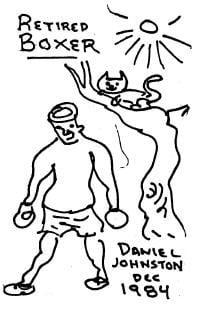
AH: But the play that you exhibit in your drawings with Vile Corrupt and the boxing matches—are you perpetually boxing with Vile Corrupt, and is that the only way that you battle him, by boxing?
DJ: Well, originally I thought that this creature was evolving from the innocent frog, and I thought to myself that I would like an innocent frog. And I thought it would have to develop and have more eyes to become not naive anymore. And I didn’t want it to become a monster like I thought everyone else was. But there was this Vile Corrupt that I invented that ended up on the back of the cover. When I started drawing again, I was boxing this thing. And without even thinking, I was fighting this thing, whatever it was. And then I had a girlfriend, and I had never had a girlfriend before, and I hadn’t had much sex with girls, and I became a monster. She didn’t give me enough love, or what I needed or whatever, and all I got was sex, and I became a monster. And I was battling myself. It was terrible. It was a nightmare. This Vile Corrupt was me at this point. But then there was another point I thought I was Satan. I don’t fight anymore. I’m not boxing anymore. Of course, I’m not drawing anymore. I thought that I had it all figured out. You would probably do a lot better than me if you were interviewed.
AH: Nobody ever has it all figured out.
DJ: But I believe that there is a high God, and that stays the same.
AH: So the drawings were inspired by some inner conflict, and now you’ve resolved some of that, and the drawings don’t come as much. So the drawings were like dreams. Did you dream some of this stuff back then?
DJ: I don’t remember my dreams, but some people do. I mean, some people remember my dreams for me.
AH: What about the cover of Artistic Vice—did you put that collage together?
DJ: Yeah, I did.
AH: Obviously, there are some things you enjoy, like the Beatles and Casper. There’s a little guy on the left that’s coming upon some devil worshippers, and I think it’s Captain America’s alter ego…
DJ: No, it’s not. It’s a Jack Kirby creation there.
AH: There’s Frankenstein, and then there’s a little black and white photograph of a man…
DJ: That’s Jack Kirby.
AH: Where did you get the photograph?
DJ: From a 50-cent Kamandi comic book special. I’m going to name my first son Kamandi, the Last Boy on Earth. I mean, I won’t call him Kamandi, the Last Boy on Earth; I’ll call him Kamandi Johnston.
AH: Where is, “I’ll do the best I can, Dad, but it’s gonna be hell trying to stop the Angel of Death” from?
DJ: That’s from Quicksilver. That was another Jack Kirby comic book.
AH: And then you’re standing next to a statue of George Washington. Where was that?
DJ: That was in Austin, Texas, a long time ago. Right on campus.
AH: Do you like George Washington?
DJ: He was the first president of the United States, and he reminds me of my friend Ron Harris. He was the man who discovered grievances. You know the song “Grievances” on Songs of Pain? All my songs are based on it. And he discovered that song. I played it, and he said, “Play it again.” And he liked it, so I kept playing it and improving it, and it became my song of songs that all my songs are based on. Songs like “Almost Got Hit by a Truck.”
AH: That’s great song, by the way. It’s one of my favorite songs of yours. It’s so pretty and sad sounding.
DJ: It’s all true.
AH: Did that happen to you?
DJ: Lots of times. In the song it says like three or four times. Each one is true.
AH: Are you wandering around in the street on purpose, or are you spacing out?
DJ: I’m always sort of wandering around. I’m sort of an idiot savant, I suppose. I’m not too smart.
AH: I think you’re pretty smart.
DJ: I fooled you.
AH: Anybody who’s written as many songs with as much content to them as you have has got to have some intelligence. I think they’re fooling you.
DJ: Well, once again I was denying.
AH: There’s a clipping here that says, “Draw first day, no lessons, no talent.” Is that how you felt about yourself when you first started drawing?
DJ: No. I always felt like I was a star. Somebody told me when I was a kid that I was going to be famous. I don’t know if I came up with this idea myself. In elementary school I’m already thinking I’m going to be famous, and I’m drawing pictures with that intent.
AH: Were you drawing when you were a little kid?
DJ: Yeah.
AH: And what were your drawings like then?
DJ: Dinosaurs, monsters, and I’d make up my own super heroes, and armies—soldiers fighting and killing each other.
AH: I was into the same stuff when I was a kid. What were some of the names of the superheroes?
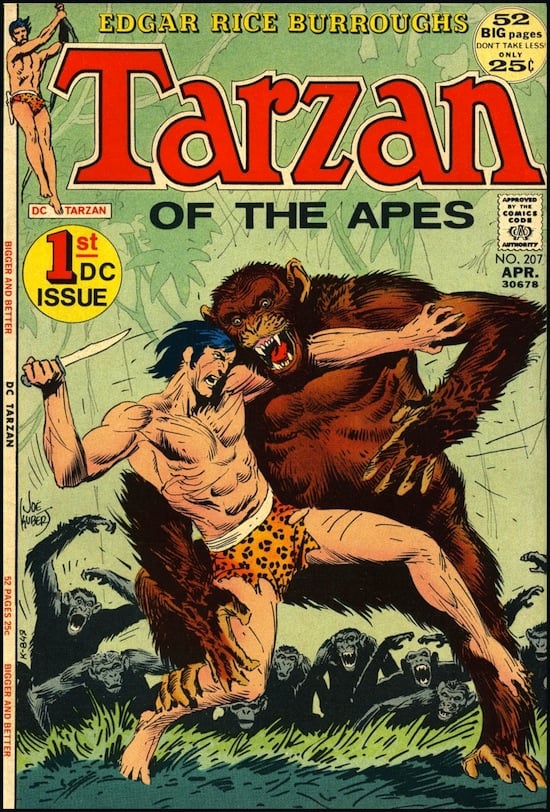
DJ: Gargantua, Tarzan, Tom the Pirate, Sassyfras the Cat…that was my big hero when I started making my own comic books: Cool Comics Presents. I used to draw my cat, and she turned into a superhero and was fighting all the comic book heroes and fighting Frankenstein and everybody.
AH: Did she win?
DJ: Of course.
AH: Did she have a cape and stuff, or was she basically a normal cat?
DJ: Well, she started out as a girl cat, but she turned into a man in the comic book. I was sort of a sidekick… [abruptly changes tone; urgent] If there was something I could say to make anyone reading this right now feel relaxed and entertained. These are words being printed right now. I’m actually saying them now, but you’ll be reading them later. I just want to entertain you everybody, and that’s what I’m trying with my songs. For me, the horror movies and the twilight zones and the comedy and the good times, it’s real, and in my art, it’s the ultimate for me to be able to express these things because it makes them real for me. It’s not real until I put a frame around it. I’m excited for now to have the opportunity to entertain and be able to get on stage and put on a show.
AH: What does “Walking the Cow’” mean?
DJ: There was that Borden ice cream that had the little girl walking the cow on the wrapper. I cut it out and glued it on my notebook. And later when I picked up my chord organ and started writing songs, I looked at that and I wrote down “Walking the Cow,” and when I’d finished, I thought I’d done something pretty cool.
AH: But then in “Keep Punching Joe,” you say, “I’ve been singing the blues and walking the cow.” Did walking the cow become like singing the blues for you?
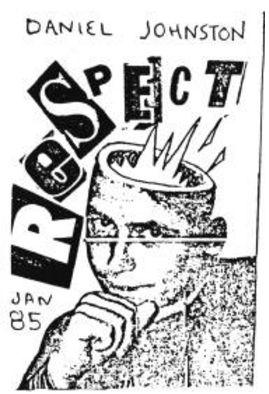
DJ: What it represented was walking your responsibility. It’s like a burden to me, like walking the cow was bearing your cross. I don’t want to stay here, but I’m walking the cow.
AH: So it’s sort of living out life, carrying on.
DJ: Yeah, that’s another song of mine, “Living Life.”
AH: On the Artistic Vice collage, you have a sign saying “Girls, Girls, Girls.” Where did that come from?
DJ: From Sad Sack. He really likes the girls, and I do too. I love pictures of girls, and movies with girls, and girls in person even. It brings life into my little world.
AH: Well, there will be girls in your audiences when you go out playing.
DJ: Yeah, that’s exciting. I want to put on a good show.
AH: Will you be playing electric or acoustic guitar?
DJ: Acoustic.
AH: Have you ever played electric guitar much?
DJ: No, I haven’t. I’d like to pick it up some day. Hopefully, I could learn some new chords.
AH: On “Sorry Entertainer,” you played on a detuned Smurf guitar. Have you ever experimented with changing the tuning on a regular acoustic guitar?
DJ: Yeah, but I haven’t released any of it. But I’ve horsed around a lot like that.
AH: It sounds like you have a good ear for taking something that’s in a weird tuning and actually making a song out of it, which is something not very many people can do.
DJ: Yeah, like I said, I wish I had more time in the studio to experiment. If I had the time I would start recording some noises and add on to it.
AH: Would you like to sample stuff from your life?
DJ: I’ve done things like that before, taking little clips of things and putting them together. I’d like to experiment like that.
AH: What do you think of rap music and the whole idea of building collages of different sounds to make a new song?
DJ: It’s great. What’s the matter with the rappers taking a song that’s already been out? That’s fine. If they make it sound cool, it’s alright.
AH: People playing real instruments in bands are also incorporating tape loops and samples like Kramer with Bongwater uses tapes over real instruments.
DJ: I like it a lot. On my tapes there are a lot of little things between the songs, and I plan to put a lot of those in the Songs of Pain album.
AH: In “Hi, How Are You,” you used one of those Farmer John things, the cow sound. That’s great. I remember when I heard the record that I’d had one of those. You were obviously playing with all of your nephew’s stuff, right?
DJ: Yeah, even the chord organ was my nephew’s.
AH: Do you still have it?
DJ: Something happened to it. Nobody knows where it is anymore.
AH: Do they still make those things?
DJ: I have a couple of them. I bought one in a rummage sale, and people have given me some.
AH: Do you ever play it?
DJ: I played it a little bit on Artistic Vice on “I Know Casper.”
AH: Do you have any ambition when you get out to do more visual art?
DJ: Yes, I’d like to make videos. I’ve got a video camera now. I’d like to get together with friends and people I meet and make these crazy video story ideas.
AH: Like what sort of stuff?
DJ: I’ve made some that have been pretty fun. We just made it up as we went along. We’d stop and get some more ideas and film again. It was a lot of fun. There’s a video that Randy Camper made that’s really good.
AH: What’s that?
DJ: He made a 45 minute video of stuff that he shot of me.
AH: Playing music or talking?
DJ: Both.
AH: Do you mind being videotaped?
DJ: I love it. I live for that moment when I can be part of a production of art, a drawing or recording a song. When that video camera is on, I’m ready; I become my true, crazy self.
AH: You’re a born star.
DJ: Well, a ham maybe. I’ve always wanted to make people laugh. There have been years where I was depressed, and I was a total recluse, and I didn’t talk to anybody, and I didn’t have any friends really. But that’s just part of my manic depression. Manic depression is a frustrated mess.
AH: Do you like Jimi Hendrix?
DJ: Yeah, I love him.
AH: I talked to Neil Young a while ago, and at the end of the interview I gave him a tape of Yip Jump Music because I had just started listening to you. And I told him to listen to it.
DJ: Wow, I was really listening to Neil Young really heavy when I recorded that album.
AH: I figured that. I heard the connection when I first heard you. Which Neil Young stuff do you like the most?
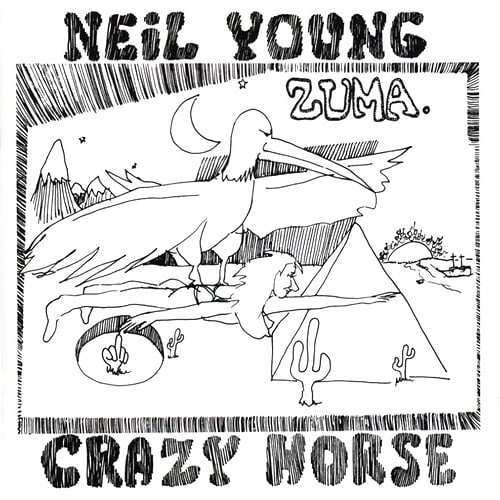
DJ: I like Zuma, Tonight’s the Night. I used to get all the albums on 8-track tape.
AH: Back in the ’70s.
DJ: Everything he’s done is cool—CSNY, Buffalo Springfield.
AH: Do you ever sing other people’s tunes?
DJ: I used to sing all the Beatles’ tunes, because I had a Beatles songbook. I used to get these songbooks and sing these old ragtime Tin Pan Alley songs, and I used to play at the rest homes. I’d put on a show and play “Tip-Toe Through the Tulips,” and “Anything Goes,” and “Happy Talk” from South Pacific. In the song, a Chinese lady sings it, and it’s totally different. I had never heard it; I just learned it from the sheet music.
AH: I recognized the tune when I heard your version of it with Jad. So is there anybody else that you listen to, any other bands or anything that you would like to work with if you were given the opportunity?
DJ: Yeah, I’d like to work with just about anybody that would like to goof around. I’d like to play drums with somebody else. Just get together with people with 4-track machines and horse around, not be paranoid about being in a studio.
AH: Why drums?
DJ: I love to play drums. I got to play drums with Jad, and I felt like the Mighty Thor.
AH: It gives you a feeling of power. I play music with electric bands, and every time I get up there to play I’m always amazed at how loud the drums are. One more thing, on the cover of Artistic Vice, there are four red stars and a numeral 7 on the bottom right. What does that mean?
DJ: I had some empty space, so I thought I’d put a lucky 7.
AH: Are there any other significant numbers in your life?
DJ: Number 9 is the human number. “Number 9, number 9, number 9…”
AH: What do you think that song is about?
DJ: It’s about the Great Tribulation.
AH: About the End Times? Why do you think what’s-his-name killed John Lennon?
DJ: Because he was insane.
AH: Do you think John would still be making music today?
DJ: Yeah. I believe the Beatles would have been back together. It would have been a dream come true for me. I think about the Beatles that much.
AH: Have you ever written to Paul McCartney or tried to get in touch with him?
DJ: No, but I sent some letters to Yoko at the Dakota when I was in New York. I left her a bag of tapes.
AH: I bet she’d appreciate your music.
Originally published in MONDO 2000, Issue #8, 1992.
CURATED SERIES at HILOBROW: UNBORED CANON by Josh Glenn | CARPE PHALLUM by Patrick Cates | MS. K by Heather Kasunick | HERE BE MONSTERS by Mister Reusch | DOWNTOWNE by Bradley Peterson | #FX by Michael Lewy | PINNED PANELS by Zack Smith | TANK UP by Tony Leone | OUTBOUND TO MONTEVIDEO by Mimi Lipson | TAKING LIBERTIES by Douglas Wolk | STERANKOISMS by Douglas Wolk | MARVEL vs. MUSEUM by Douglas Wolk | NEVER BEGIN TO SING by Damon Krukowski | WTC WTF by Douglas Wolk | COOLING OFF THE COMMOTION by Chenjerai Kumanyika | THAT’S GREAT MARVEL by Douglas Wolk | LAWS OF THE UNIVERSE by Chris Spurgeon | IMAGINARY FRIENDS by Alexandra Molotkow | UNFLOWN by Jacob Covey | ADEQUATED by Franklin Bruno | QUALITY JOE by Joe Alterio | CHICKEN LIT by Lisa Jane Persky | PINAKOTHEK by Luc Sante | ALL MY STARS by Joanne McNeil | BIGFOOT ISLAND by Michael Lewy | NOT OF THIS EARTH by Michael Lewy | ANIMAL MAGNETISM by Colin Dickey | KEEPERS by Steph Burt | AMERICA OBSCURA by Andrew Hultkrans | HEATHCLIFF, FOR WHY? by Brandi Brown | DAILY DRUMPF by Rick Pinchera | BEDROOM AIRPORT by “Parson Edwards” | INTO THE VOID by Charlie Jane Anders | WE REABSORB & ENLIVEN by Matthew Battles | BRAINIAC by Joshua Glenn | COMICALLY VINTAGE by Comically Vintage | BLDGBLOG by Geoff Manaugh | WINDS OF MAGIC by James Parker | MUSEUM OF FEMORIBILIA by Lynn Peril | ROBOTS + MONSTERS by Joe Alterio | MONSTOBER by Rick Pinchera | POP WITH A SHOTGUN by Devin McKinney | FEEDBACK by Joshua Glenn | 4CP FTW by John Hilgart | ANNOTATED GIF by Kerry Callen | FANCHILD by Adam McGovern | BOOKFUTURISM by James Bridle | NOMADBROW by Erik Davis | SCREEN TIME by Jacob Mikanowski | FALSE MACHINE by Patrick Stuart | 12 DAYS OF SIGNIFICANCE | 12 MORE DAYS OF SIGNIFICANCE | 12 DAYS OF SIGNIFICANCE (AGAIN) | ANOTHER 12 DAYS OF SIGNIFICANCE | UNBORED MANIFESTO by Joshua Glenn and Elizabeth Foy Larsen | H IS FOR HOBO by Joshua Glenn | 4CP FRIDAY by guest curators
